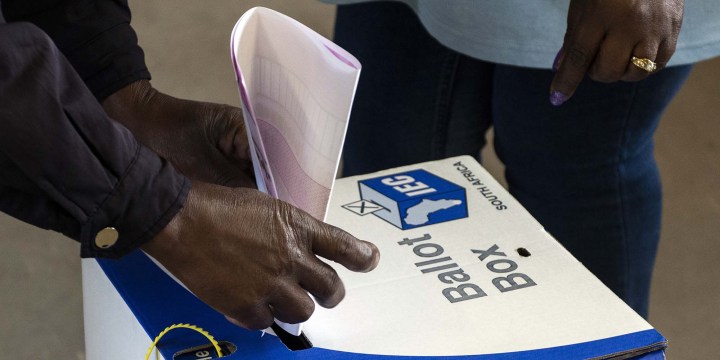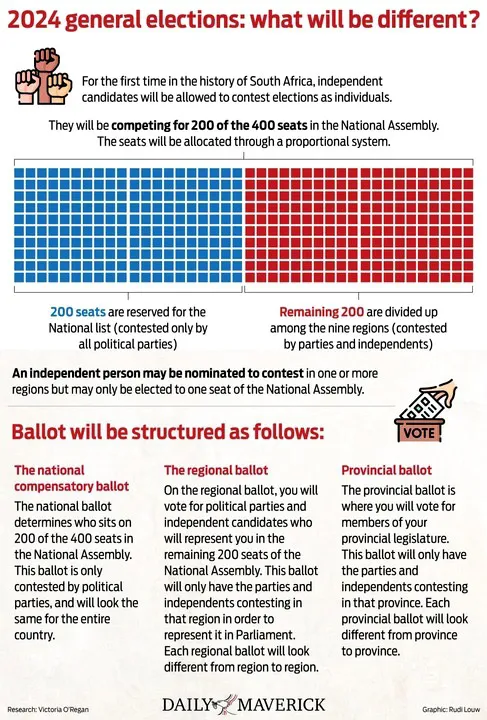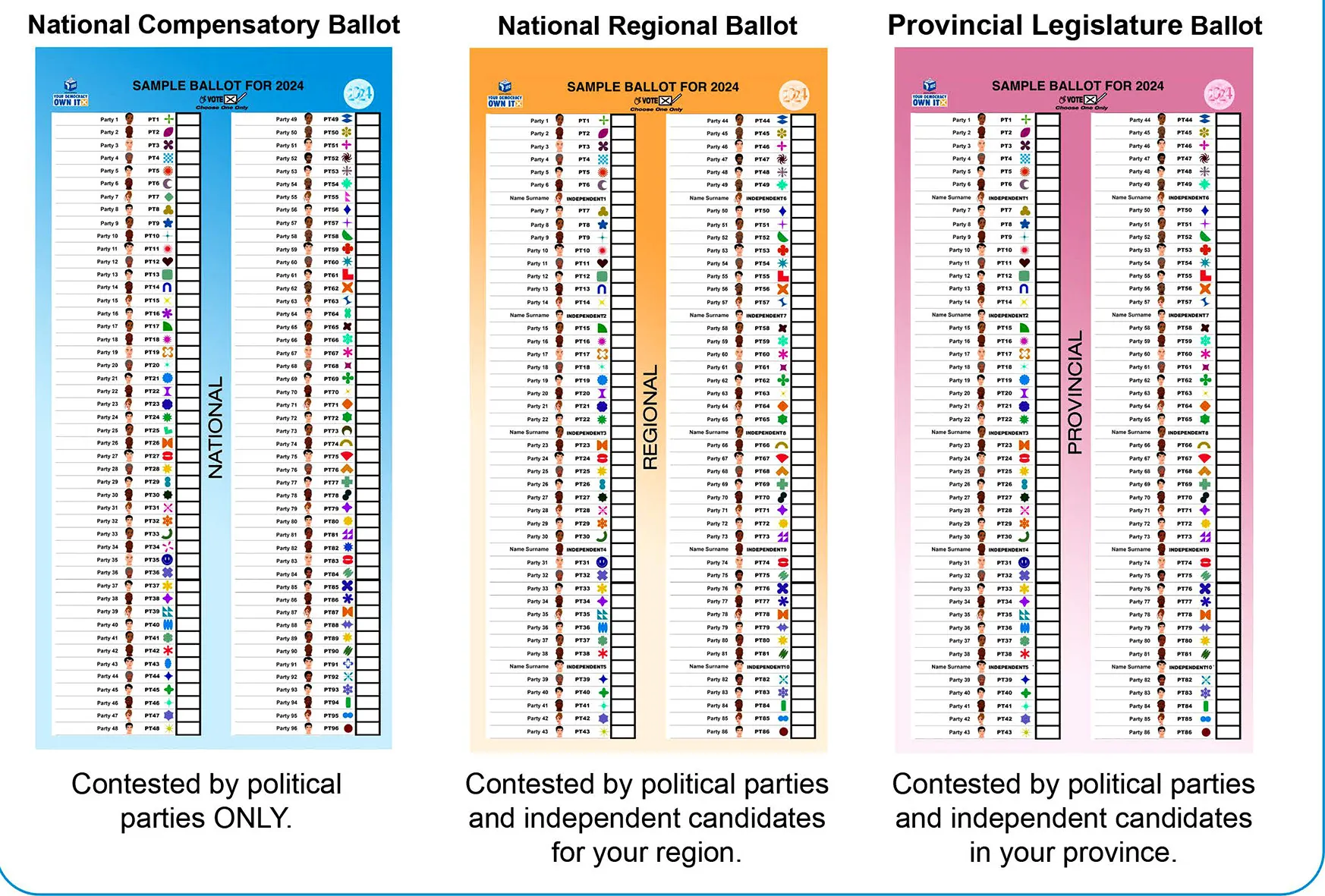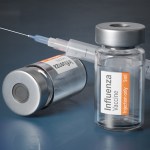ROAD TO 2024 ELECTIONS
Explainer — how to vote using the new three-ballot system

For the first time, millions of South Africans will vote on three ballot papers in the upcoming national and provincial elections. Here’s how the new system will work.
The Electoral Commission of South Africa (IEC), political parties and various civil society organisations are making final preparations for the general election on 29 May.
The highest number of political parties in the history of South Africa’s democratic elections will be vying for seats in the National Assembly and the provincial legislatures. And for the first time, independent candidates have been permitted to contest a general election in South Africa at provincial and national levels.
While this has been hailed as a significant milestone in South Africa’s young democracy, the new three-ballot voting system could cause confusion among voters.

Read more in Daily Maverick: Elections 2024
How do the three ballots work?
After President Cyril Ramaphosa signed the Electoral Amendment Bill, which expanded electoral participation, into law on 17 April 2023, the IEC had to find a way for independent candidates to freely and fairly participate in the election without upsetting the balance of the seat allocation in the National Assembly.
This is why voters will be given three ballots instead of the usual two when they arrive at the polls.
First is the national ballot, which contains a list of the 52 political parties contesting 200 seats in the National Assembly. This ballot will be the same across the nation.
On the ballot, each party will be represented by its name, next to an image of the party’s leader, its abbreviation and logo.
Second is the regional ballot, which is to vote for political parties and independent candidates contesting for the 200 seats reserved for regions (provinces) in the National Assembly. The seats are divided among the regions based on the number of registered voters in each one, meaning Gauteng is allocated the greatest number of these seats and Northern Cape the least.

The IEC says voters are required to mark each ballot paper. (Image: IEC)
Unlike the national ballot, this ballot includes only the independent candidates and political parties that are contesting a particular region.
Political parties will be presented on this ballot in the same way as on the national compensatory ballot. For independent candidates, the name and image of the candidate and the word “independent” will appear on the ballot.
Finally, there is the provincial ballot, which is unique to each province. Voters will use this ballot to elect political parties and independent candidates to serve in their province’s legislature.
It’s worth pointing out that voters aren’t required to vote for the same party or independent candidate on all three ballots.
Voters must mark each ballot paper with a single X for their preferred candidate, whether a party or an independent. As the IEC puts it, “One ballot paper, one mark.”
Can I vote outside my province or district?
You can vote on the national ballot outside the province or district where you are registered, but you need to notify the IEC about your intention to vote outside of your district by midnight on Friday, 17 May.
If you vote outside the region where you were registered, you will only receive the national ballot. This means you can only elect a political party contesting for the 200 national list seats in the National Assembly.
You will also need to indicate which voting district you plan to vote in. Click here to notify the IEC which province or district you intend to vote in if you’re not planning to vote where you are registered.
What if I’m not able to vote on election day?
If you are unable to make it to the polls on 29 May, you can apply for a special vote.
Special votes will take place in SA on 27 and 28 May. Citizens outside the country can cast special votes at South Africa’s diplomatic missions abroad on 17 or 18 May, depending on the weekend configuration of the country.
Here is the list of South Africa’s foreign missions, including high commissions, embassies and consulates.
Applications for special votes are open until Friday, 3 May. DM

















Thank you for the clear information.
Thanks for the guidance. Can only imagine how much longer each vote is going to take in ill educated rural areas and by people without a reasonable intellectual grasp of forms with multiple images and text.
Does it make sense to vote:
Provincial ballot = the party that does a good job or would do a better job.
National Ballot = probably the same party as Provincial.
National Regional Ballot = the party or individual that you want your party in the above ballots to partner with.
What I’d like to understand, is whether 30,000 votes for a small party or individual on the national regional ballot would have more of an impact than those same 30,000 votes for one of the main parties?
Not sure what the number is, just using 30,000 by way of example. It gets complicated because in the national regional ballot, those 200 seats are not split by actual ballot results. Each province has a number of seats reserved already. That split is based on REGISTERED voters not ACTUAL voters. So it goes Gauteng 47, KZN 41, ECape 25, WCape 23, Limpopo 19, Mpumalanga 15, NWest 13, FreeState 10, NCape 5. Unhelpfully, the IEC gazetted table adds up to 198 and not 200….
What is almost certain to happen is that parliament seats in the national regional allocation will have received significantly different actual votes if turnout is very different per province.
NCape as example. Have 636k registered voters for 5 seats allocated. At 50% turnout it means a proportional seat every 63.6k votes, but what happens if ABC get 40k votes = 0.63 seats and DEF gets 89k votes = 1.4 seats? That is where 20k extra votes for ABC could ensure both ABC and DEF get a seat.
Hi Johan, Have you any further insight following your queries of 25 April? I, too, find it strange that a system has been designed which potentially wastes votes for similarly positioned parties. By way of example, if an independent candidate gets 3 times the threshold of votes required, he / she still gets only one seat and the “unnecessary” votes could have been cast to get a similar person into the National Assembly. Your comments would be appreciated.
Multi-candidate constituencies = clear a mud. They should have gone for 200 single member first-past-the-post constituencies, with proportionality drawn from the national lists. i.e. a proper mixed-member proportional system.
Glad yo have the opportunity to vote